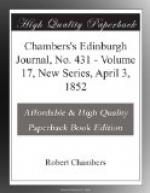him to attend the lectures, and assist in preparing
the demonstrations. Thus Dickson spent many winters,
at once attendant and pupil, returning to the country
in summer in his old capacity. By degrees, he
completed his medical education, obtaining gratis-tickets
from the professors—a favour sometimes
extended to deserving students, and of which he was
well worthy. Dr Barclay once gave a good lesson
to those who apply for such gratuitous favours for
others. He was asked by a certain bookseller to
give a perpetual gratis-ticket for his class to a student
then standing in the shop, who could ill afford to
pay the four-guinea fee. ‘Most certainly,’
said the doctor; ’I can never refuse in such
a case. By the by, Mr ——, I
want a few books; will you look them out for me now?’
and the doctor enumerated several standard medical
works, which were produced with great alacrity.
He then selected four guineas’ worth from among
them, and handed them over to the astonished student,
along with a lecture-ticket, saying: ’Of
course, Mr —— intended giving you
the same value in books which I do in this ticket!’
The bookseller, although a notoriously parsimonious
character, had not a word to say. Dr Barclay
took great pride in collecting a library, and invented
the following device as a mark for his books:
His initials were engraved in the centre of an oval,
at the top was the sun, with the motto—’I
weary not;’ below, was a mountain, with ‘I
am firm;’ and surrounding all, ‘Excel
if you can.’
These graphic mottos became the guiding-stars of John
Dickson’s career: he wearied not, nor wavered
in whatever pursuit he engaged; and it was to this
indomitable industry that he owed his success in life.
His perseverance was displayed even in his amusements;
he was fond of music, but had not a sufficiently correct
ear to play the violin well, yet he would not abandon
it, but scraped away year after year, in hopes of
ultimate success, although in this instance without
attaining his object. In more important pursuits,
his industry was amply rewarded; and having taken
his degree, we must now call the heretofore denizen
of the Pit, Dr Dickson, and record, that the students
of the university, on his leaving Edinburgh, presented
him with a testimonial, to signify their appreciation
of his valuable demonstrations in the class of Practical
Anatomy. Some of his preparations may still be
seen in the Museum of the College of Surgeons.
An appointment as assistant-surgeon in the navy was
now procured for him; medical officers being then
in greater request than they are in these piping times
of peace. With affectionate regret, and not unmanly
tears, he left the home that had sheltered him for
so many and such important years of his life, and
towards which he ever evinced the warmest attachment.
His gratitude was not long in shewing itself practically.
In a few years, he returned from abroad; and on landing
in Britain, heard that the son of his former benefactor,




